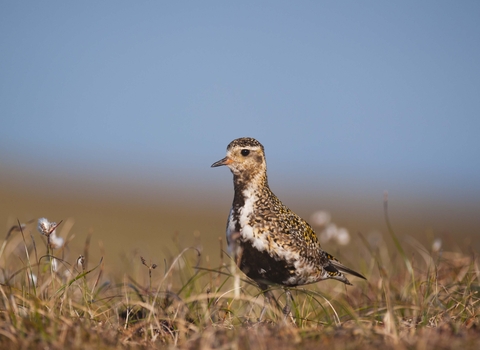
©Andrew Parkinson/2020VISION
Golden plover
From spring, look out for the beautiful, speckled gold-and-black breeding plumage of the golden plover. It can be found in its upland moorland breeding grounds from May to September, moving to lowland farmland and fields in winter.
Scientific name
Pluvialis apricariaWhen to see
January to DecemberTop facts
Stats
Length: 26-29cmWingspan: 72cm
Weight: 220g
Average lifespan: 4 years
Classified in the UK as Green under the Birds of Conservation Concern 5: the Red List for Birds (2021). Protected in the UK under the Wildlife and Countryside Act, 1981.
Habitats
About
The golden plover is a little smaller than the Lapwing, with which it often gathers in large numbers on farmland and coastal flats during the winter. In summer, it is found in upland moorland habitats where it breeds from May to September. It nests on open ground among heather and grass, and the female lays about 4 eggs. Both parents care for the chicks.What to look for
The golden plover is smaller than its relative, the grey plover. In summer, adults have a black throat, chest and belly, surrounded by a band of white and topped with a distinctive, spotted gold-and-black back and cap. In winter, they lose their black and turn more buff in colour, with a pale throat, chest and belly. In mixed flocks, golden plovers can be distinguished from lapwings by their sharp, pointed wings (lapwings have bluntly rounded wings).Where to find
Nests on moorlands in Scotland, northern England, Wales and Devon. Spends the winter on lowland farmland and muddy estuaries around the coast.Did you know?
There are two other species of golden plover: the American golden plover (which breeds in Canada and Alaska and winters in South America), and the Pacific golden plover (which breeds northern Asia and winters in South Asia and Australia). Both species are extremely rare visitors to the UK each year.Watch
Golden Plover (https://vimeo.com/444901835)
Golden Plover by Lee Harris
